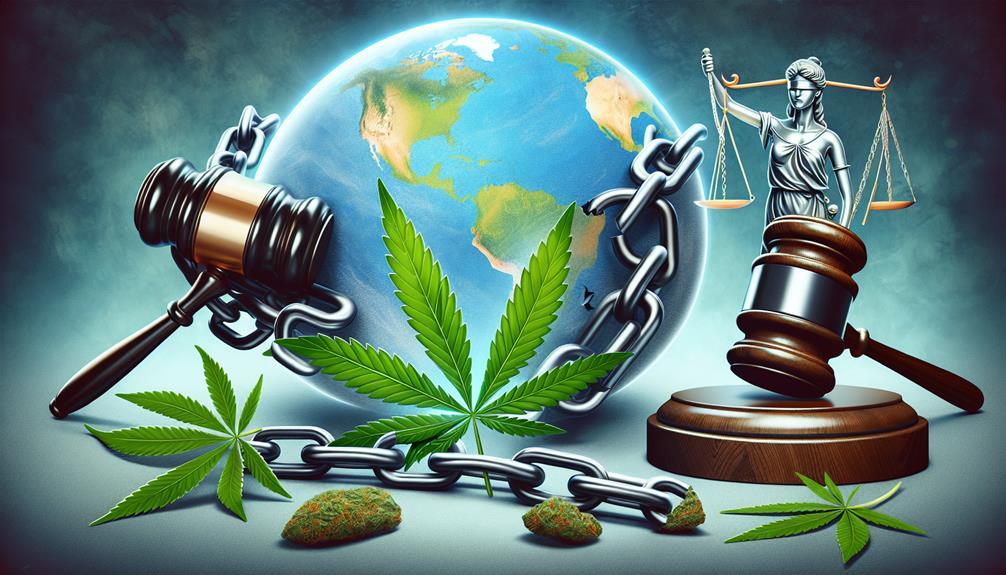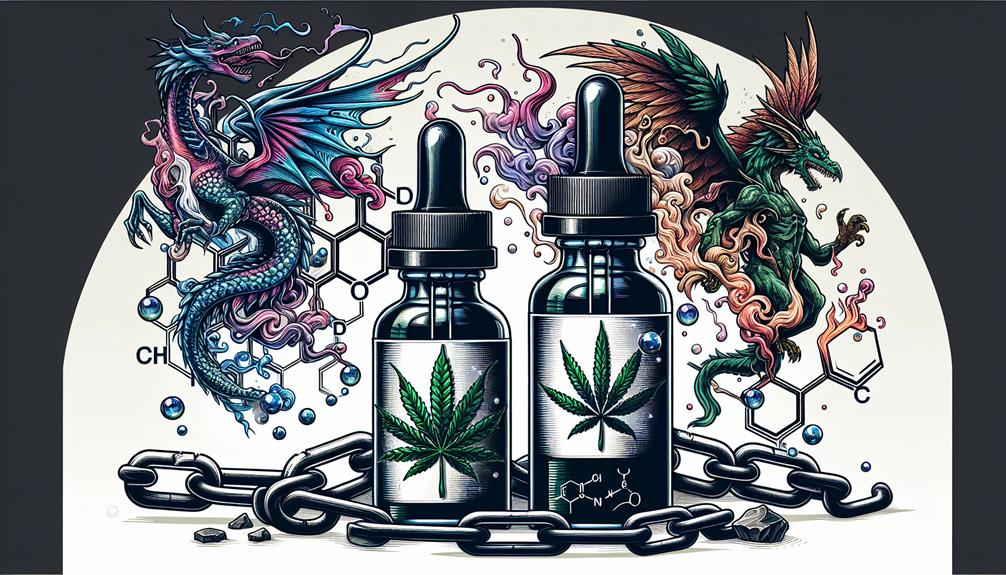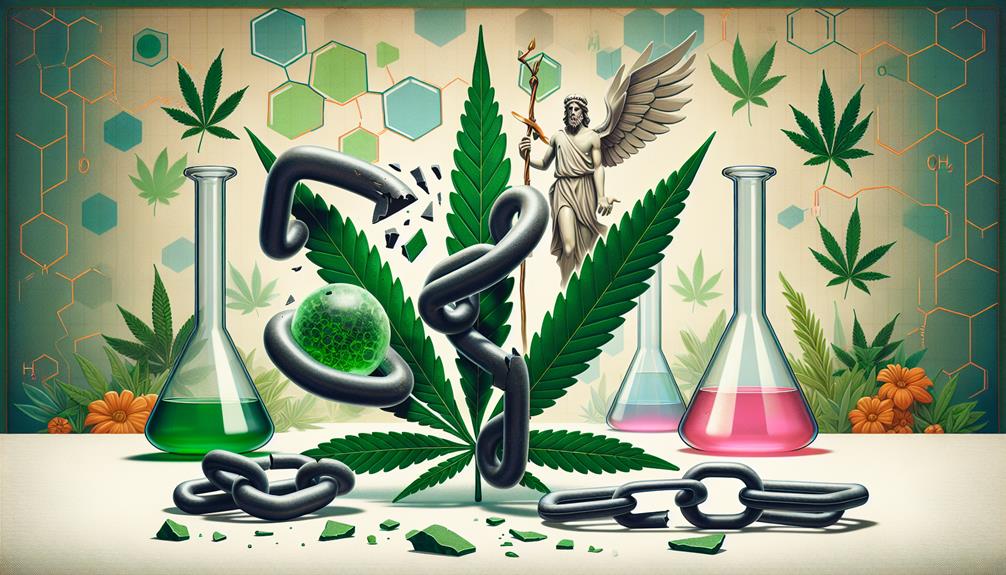In the swirling mists of misinformation, CBD's true nature often remains shrouded in myth. You might have heard whispers that CBD can get you high, or perhaps you've been warned of its supposed legal gray areas. Let's clear the air: CBD won't send you on a psychedelic journey, and its legal status is more black and white than you've been led to believe. Whether you're a skeptic or a curious bystander, it's crucial to discern the seeds of truth from the chaff of fiction. By exploring the facts, you'll discover the genuine benefits and limitations of CBD, and why it's essential to approach this topic with an informed perspective. So, let's embark on a quest to unveil the reality behind these common misconceptions, ensuring you're well-equipped to make educated decisions about CBD's place in your life.
Understanding CBD Fundamentals
Delving into the basics of CBD, it's crucial to recognize that this non-intoxicating compound, found in cannabis plants, won't impair your cognitive abilities or induce a high. Cannabidiol (CBD) is one of many chemical compounds in the cannabis Sativa plant, distinct from its more infamous counterpart, tetrahydrocannabinol (THC), which is known for its psychoactive properties. Unlike THC, CBD doesn't interact with the endocannabinoid system in a way that produces a mind-altering state, making it a subject of interest for its therapeutic potential.
You'll find CBD in both hemp and marijuana, but it's the hemp-derived CBD that's most commonly used for wellness products, as it typically contains minimal THC. This is an important distinction because the varying levels of THC in cannabis plants influence both the legal status and the psychoactive effects of the derived compounds.
Effective CBD dosages can vary widely among individuals, emphasizing the need for personalized approaches to its use. Before you consider integrating CBD into your routine, you must stay informed about the legal landscape, as the legality of CBD differs from place to place. Always ensure that you're in compliance with your local laws to avoid any legal issues.
Myth 1: CBD's Psychoactive Effects
Despite common misconceptions, CBD does not elicit psychoactive effects, meaning it won't get you high as THC does. This is one of the most pervasive myths and misconceptions surrounding CBD and marijuana. It's essential to understand the difference between CBD and THC, both compounds found in the cannabis plant but with different properties. THC is the main psychoactive component that alters your mental state, while CBD does not have this effect.
Separating fact from fiction, let's delve into the details:
- CBD is non-intoxicating: It doesn't produce the 'high' associated with THC.
- THC content: Legal CBD products must contain less than 0.3% THC, which isn't enough to cause psychoactivity.
- CBD's effects: It may offer therapeutic benefits without altering your mental state.
- Legality: CBD's lack of psychoactive effects contributes to its legal status in many regions.
- Research: Studies continue to explore CBD's potential, focusing on benefits, not mind-altering properties.
Your understanding of CBD should be rooted in evidence. Remember, the goal is to appreciate CBD's potential without the cloud of misinformation regarding its psychoactive effects. Always consult scientific resources and regulations to stay informed about the true nature of CBD.
Myth 2: Legality and Accessibility

You may think CBD is universally legal, but its status actually hinges on the plant it's extracted from and can vary widely. While hemp-derived CBD is typically legal, sourcing it from marijuana could land you in hot water if local laws are strict. Before you try to buy or use CBD, it's critical to check the most up-to-date legal requirements and accessibility options in your state.
CBD Legal Status
Many people are surprised to learn that CBD's legal status varies widely, with its legality contingent upon THC content and differing from one country to another. Here's what you need to know:
- CBD is legal in many parts of the world, provided THC content falls within legal thresholds.
- The laws governing CBD differ between countries, and even within regions.
- Always verify local laws, especially when traveling, to ensure compliance.
- Importing CBD products requires careful legality checks, especially from foreign websites.
- In the E.U., CBD is regulated under laws concerning the free movement of goods among member states.
The CBD industry and healthcare professionals are guided by comprehensive studies to ensure reputable products. Always review the privacy policy of websites before purchasing to protect your information. The scientific community continues to contribute to our understanding of CBD legal status.
Accessibility by State
It's essential to recognize that the accessibility of CBD products varies significantly across different states due to varying legal frameworks. While some states offer wide accessibility, touting CBD's potential for various health benefits, others maintain stricter controls. To ensure you're compliant with state regulations, you must stay informed about the legal status of CBD where you live.
If you're seeking CBD for overall health and wellness, it's critical to source quality products from reputable sources. This not only guarantees legality but also ensures you're using CBD products that are safe and potentially beneficial. Remember, accessibility doesn't always equate to legality, so thorough research is key in navigating the complex landscape of CBD use in your state.
Prescription Requirements Vary
While understanding state-level accessibility is crucial, you also need to be aware that prescription requirements for CBD differ widely and could affect your ability to obtain these products legally. As you explore the potential benefits of CBD for health benefits, it's vital to source products from reputable suppliers and understand the regulations within your area.
- Consult Healthcare Providers: Seek advice about CBD's appropriateness and prescription specifics.
- Know Your Region's Laws: Regulations can dictate if a prescription is necessary.
- Research Legality: Ensure you're compliant with local legal frameworks.
- Source Reputably: Only purchase CBD from trusted, verified sources.
- Understand Prescription Variances: Prescription requirements vary, impacting access to CBD.
Stay informed and analytical in your approach, focusing on the detail-oriented aspects of CBD accessibility and prescription requirements.
Myth 3: CBD Vs. Hemp Oil

Dispelling the confusion between CBD and hemp oil, you should note that these are distinct products with different applications and benefits. It's essential to separate fact from fiction when understanding these two substances, as the myths surrounding CBD and hemp oil can lead to misunderstandings about their uses and properties.
CBD is derived from the flowers, leaves, and stalks of the hemp plant and is celebrated for its therapeutic effects. On the other hand, hemp oil, which is sometimes referred to as hemp seed oil, is obtained from the seeds and is known for its nutritional content, especially in skincare and cooking.
Scientific studies have shown CBD to have potential health benefits, including anti-inflammatory properties and anxiety relief. Contrarily, hemp oil contains beneficial nutrients like omega-3 and omega-6 fatty acids, making it a healthy dietary supplement.
Here's a quick comparison to help you understand:
| CBD | Hemp Oil |
|---|---|
| Extracted from flowers, leaves, and stalks | Extracted from seeds |
| Contains cannabinoids with potential health benefits | Rich in nutrients like omega fatty acids |
| Used therapeutically, may have side effects | Used in skincare and cooking, typically no side effects |
When choosing between the two, consider your health needs and consult with a healthcare provider to ensure the best outcome for your wellness journey.
Myth 4: Addiction and Overdose Risks
You may have heard concerns about the addictive nature of CBD or the risks of overdose, but research consistently shows that CBD is non-addictive and lacks the intoxicating effects that lead to substance abuse. In fact, there are no known instances of fatal overdoses from CBD use, underlining its safety profile. It's important to distinguish between physical dependence, which is rare with CBD, and the low potential for abuse, ensuring responsible use is typically without significant risk.
CBD Addiction Potential
Contrary to popular belief, CBD is not addictive and carries no risk of overdose, making it a safe substance for consumers to use. When exploring CBD addiction potential, it's crucial to rely on scientific studies that provide clarity and dispel myths. Here's what the evidence says:
- Generally Considered Safe: CBD is widely recognized as having a good safety profile.
- No Addiction or Dependence: There's no evidence to suggest CBD causes addiction or dependence.
- Potential Health Benefits: Many users report relief from conditions like chronic pain without adverse reactions.
- Supported by WHO: The World Health Organization acknowledges the non-addictive nature of CBD.
- Helps Combat Addiction: Some research suggests CBD might even aid in reducing addictive behaviors.
Always remember, while CBD is celebrated for its health benefits, individual experiences may vary.
Overdose Possibilities Explained
While CBD is often celebrated for its therapeutic effects, it's important to understand that the likelihood of overdosing on this compound is exceptionally low due to its inherent low toxicity. Scientific studies reinforce that CBD's safety profile significantly reduces any potential for overdose. In fact, it's non-addictive, which eliminates the concerns of physical dependency often associated with overdose risks.
| Factor | CBD | Traditional Medication |
|---|---|---|
| Addiction Potential | Non-addictive | Varies |
| Overdose Likelihood | Highly Unlikely | Possible |
| Common Side Effects | Drowsiness, Diarrhea | Varies |
The table above helps illustrate the stark differences when considering overdose possibilities explained between CBD and other medications. By understanding these facts and consulting with healthcare professionals, you can navigate the myths and truths about CBD with confidence.
Dependence Vs. Safety Profile
Having established the low risk of overdose associated with CBD, it's now crucial to address the misconception that it leads to addiction, highlighting its favorable safety profile. You're seeking evidence-based information, and science is here to help clarify:
- CBD is not addictive; it does not stimulate the brain's reward system.
- Scientific studies have shown a minimal potential for dependence on CBD.
- The World Health Organization acknowledges CBD's safety profile.
- Common side effects are mild, emphasizing its well-tolerated nature.
- Always consult a healthcare professional before using CBD for mental health or other health conditions.
Understanding these points ensures you're informed about the safety and dependence risks, or lack thereof, related to CBD. It's about being detail-oriented in your approach to CBD's role in wellness.
Myth 5: CBD Research and Evidence
Some may believe that CBD's efficacy is based on anecdotal evidence alone, but a growing body of scientific research is actively uncovering its potential health benefits. As you delve into the science behind CBD, it's important to differentiate between exaggerated claims and accurate information. Studies support the idea that CBD has anti-inflammatory properties, and ongoing research is crucial to fully comprehend its therapeutic potential.
CBD is generally considered safe, and the medical industry's interest is not rooted in bias but in a genuine pursuit to understand its applications. To illustrate the current state of research, take a look at this concise table:
| Aspect | Current Understanding | Future Considerations |
|---|---|---|
| Efficacy | Supported by preliminary studies | Needs large-scale validation |
| Safety Profile | Generally considered safe | Long-term effects to be studied |
| Potential Benefits | Anti-inflammatory properties noted | Expanding scope of conditions |
| Research Bias | No biased promotion by industry | Continued neutral investigation |
Myth 6: CBD's Role in Disease Cure

Despite the buzz around CBD as a miracle cure, scientific evidence points to its role as a therapeutic agent rather than a definitive cure for diseases. It's critical to dive into the research, separating fact from fiction when it comes to understanding CBD's place in medical treatment.
Here are key points to consider:
- Potential Therapeutic Uses: CBD might offer benefits for managing certain health conditions, but it's not a panacea.
- Anti-inflammatory Effects: CBD's anti-inflammatory properties may contribute to its therapeutic potential for conditions like arthritis.
- Neuroprotective Properties: Research suggests CBD could have neuroprotective properties, potentially aiding in the management of neurological disorders.
- FDA Approval: A CBD-based medication is FDA-approved for epilepsy, indicating its credibility in specific contexts.
- Ongoing Research: The scientific community is still unraveling the full spectrum of CBD's effects, urging caution in making overstated claims.
Derived from cannabis plants, CBD has sparked a multitude of Myths About CBD, including the misconception that it serves as a disease cure. While studies are promising, they don't substantiate the claim that CBD can cure diseases outright. Instead, think of CBD as one component in a larger toolkit for supporting health and well-being, always under the guidance of healthcare professionals.
Frequently Asked Questions
Is There Scientific Evidence That CBD Works?
Yes, there's scientific evidence that CBD works. Clinical trials have demonstrated its therapeutic claims, including pain management and anti-inflammatory effects. CBD research also suggests it's beneficial for anxiety treatment. To ensure efficacy, studies often compare results with placebos. However, remember that individual responses can vary, so you should consult healthcare professionals to tailor your dosage. It's essential to keep abreast of evolving research to understand CBD's full potential.
What Does CBD Do to Your Brain Chemically?
CBD weaves its magic in your brain, altering the chemical ballet that dictates your mood and cognition. It tinkers with the neurotransmitter modulation, enhancing brain receptors' dance. These chemical interactions may offer neuroprotective properties, potentially guarding your gray matter. While it's not a panacea, its role in anxiety relief can't be overlooked. Yet, don't be beguiled; the addiction potential is low, but it's a chapter in the ongoing saga of cognitive effects.
Is CBD Psycoactive?
You're likely wondering if CBD is psychoactive. It isn't, especially when you compare it to THC. Despite CBD legality, confusion persists, often due to mixed messages about drug scheduling. On the psychoactivity scale, CBD ranks low and won't get you high, differentiating it from recreational use. Its therapeutic claims are numerous, but remember, it's crucial to consult evidence-based sources to sift through the medicinal assertions and consumer confusion.
Why Are People Obsessed With Cbd?
You're likely fascinated with CBD due to its soaring popularity, often fueled by marketing hype and the hemp trend. While some consider it a wellness fad, there's substance to the therapeutic claims, especially for pain relief and anxiety management. However, don't be swayed by all the noise; it's crucial to delve into the details, scrutinizing scientific evidence to understand why CBD has become a go-to for many seeking alternative treatments.
